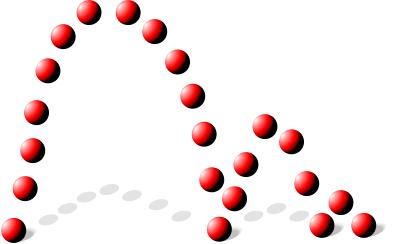One of the most annoying metrics used by SEs (Search Engines) are bounce rates. The higher they are, the less well you will do.
What is a Bounce Rate?
Someone searches for an answer to a problem, or for some further information to help solve a problem. It could be as simple as ‘cheapest iPad’ or as complex as ‘how do I build a nuclear power plant’.
The SE brings up a list of likely pages and the searcher clicks on the most relevant looking result.
If the page they land on is not relevant they leave and search again.
They have just ‘bounced’ off the page. And that page will get flagged as ‘not relevant’ for this search. That means in future, an SE is less likely to bring that page up in the results for that term.
Are all Bounce Rates the same?
No. A bounce rate is determined by the search that took the searcher there. If a page is about ‘how to setup a Facebook timeline’ and that is exactly what the searcher was looking for and what the SE brought up in the search results, then it is probably that the searcher would stay and read the whole page. Great. Result right?
She came, she saw, she left!
Well, not necessarily. If the searcher then exited that page back to the SE to look for further information, or was just simply satisfied already and did something else, then we are back to bounce rates again. She came, she saw, she left!
But what we don’t know (because the SEs are unlikely to ever tell us) is whether the time spent on one page counts for more than the number of people hitting the page then exiting the site.
Plain common sense tells me that all those incredible brains in SE land must have thought of this, so we can assume that length of time on a page (and on a site) has a big part to play when used in conjunction with bounce rates.
We do know that the length of time on a site is important (it is one of the key metrics shown in Google Analytics for example), but as I say, what we don’t know is how that relates to bounce rates.
Non-search Bounce Rates
Here’s another scenario. Someone lands on your page through some direct link (i.e. not via a search). If they exit the site (and the statistics are being tracked through an SE) then the bounce rate of that page will increase. But in this case it is not tied into a search term. There is no relevant relevancy for the statistics! Think about that.
How to reduce your Bounce Rates
So, on to the ‘what to do about bounce rates’ part. It is all down to site navigation. Whatever page someone lands on, and however it was that they arrived there in the first place, always give them some good reason to continue reading.
At the end of each page, add some relevant links. Ideally these will be links to further pages in your site. But you can also include an external link or two if they are useful and relevant.
The most successful site in the world in terms of SEs is Wikipedia. Look at the number of internal and external links they have. They must be doing something right.
Here’s something you could also try. Give your readers a choice. Do this on your main traffic pages. Rather than go straight into the detail when they land. Write an introduction, then give them a choice of how to continue reading. For example, on a glossary I compiled, I give readers the choice of going to the A-N section or the M-Z section. My average bounce rates dropped from 90% to 46%. That also meant my overall site bounce rate reduced.
It doesn’t matter which way you look at this. If your bounce rate goes down, it is a good thing.
Gaming the System?
It could very easily be argued that this is gaming the system. Trying to cheat somehow. Well, I guess that may be true, but wait a minute. The easiest way to find things is to categorise them. To use some kind of pigeon hole and place things in there.
Connect them with easy to choose links and you get a useful system. It is what a dictionary does. It is what Wikipedia do. Organise your site so it connects together with shorter articles if necessary. Join everything up so your reader can more easily navigate your site and choose what they want to read.
Taking my own advice on Bounce Rates – NOT!
I could have done the same thing here. But I wanted to give you all the information in one go. If this page fails because some SE algorithm decides its bounce rate is more important than its content, so be it.
Please leave a comment below and let me know what you think.


Leave a Reply